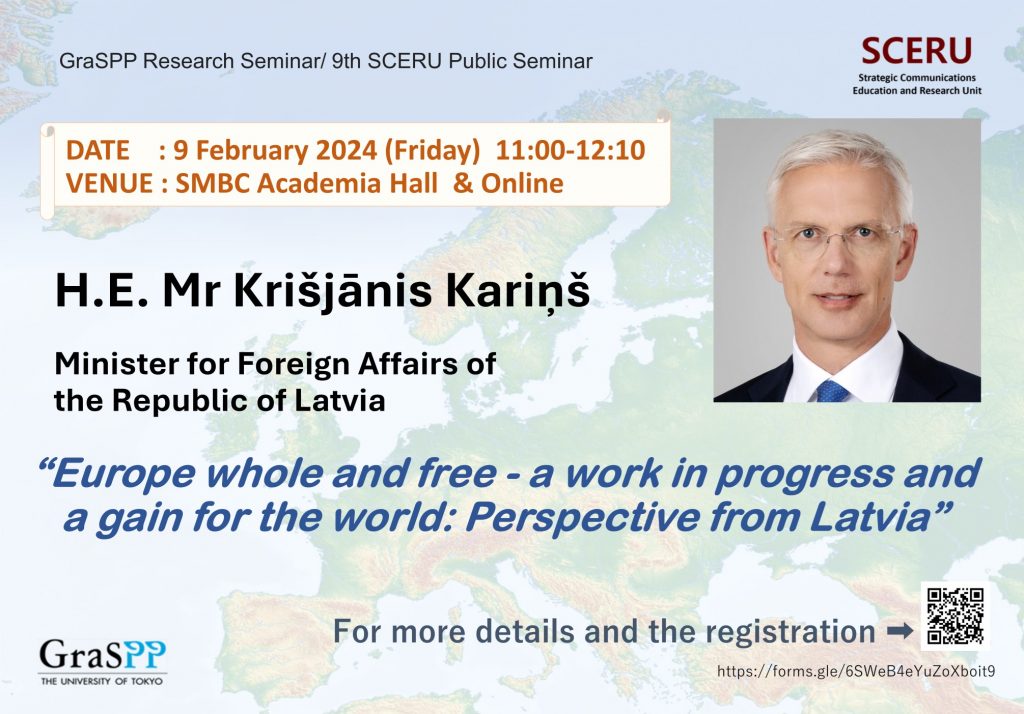Europe whole and free – a work in progress and a gain for the world: Perspective from Latvia

SCERU, alongside the Graduate School of Public Policy (GraSPP), held a public seminar titled “Europe whole and free – a work in progress and a gain for the world: Perspective from Latvia” on 9 February 2024.
The ninth SCERU Public Seminar invited H.E. Mr Krišjānis Kariņš, Minister of Foreign Affairs and former Prime Minister of Latvia, as a guest speaker. Within 10 years of the post-Cold War era, Latvia transformed itself from a country occupied by the USSR to a democratic nation fully integrated into both the European Union and North Atlantic Treaty Organization. Foreign Minister Kariņš, in a speech entitled “Europe Whole and Free,” presented the Latvian perspective on his country’s remarkable transition. He argues that the preservation of a rules-based international order is essential not only for the survival of a small country such as Latvia but also for the preservation of the free world today. For like-minded countries, Mr Kariņš stressed the importance of multilateral institutions today as a way of deterring aggression and preserving foundational values — fundamental freedoms, democracy and the rule of law.
Synopsis:
H.E. Mr Krišjānis Kariņš, Minister of Foreign Affairs and former Prime Minister of Latvia, in his first public lecture to address the Japanese public, will discuss Latvia’s experience of transformation from a country occupied by Soviet Union to an independent, democratic nation, fully integrated into both European Union and the North Atlantic Treaty Organization (NATO). He will argue that the end of WW2 did not bring security to Latvia, as Soviet occupation continued until 1990. Only through the reunification of Europe and the enlargement of the EU and NATO were peace, security and prosperity ensured. Out of such experience, he will explain, emerges Latvia’s firm commitment and belief in the rules-based international order and the right of nations to choose freely the security institution to which they wish to belong.
Based upon that commitment, he will present Latvia’s view on the Russian invasion of Ukraine and the impact it has had on Europe’s security, while linking European security and that of the Indo-Pacific. He will argue that the Russian invasion has demonstrated that the security of Ukraine, Moldova, Georgia and countries in the Western Balkans are linked and that these states have the right to choose their own future. The aforementioned states, just like Latvia, see themselves as an integral part of a strong and united Europe.
He will conclude by explaining Latvia’s vision of future security, considering its ongoing endeavors toward the vision of Europe whole and free. Latvia continues to strengthen its ability to counter global and interconnected threats and challenges, including terrorism, conflict and instability in various hotspots, coercive policies, cyber-attacks, climate change and many others, independently and by working collectively with other states. In its aspiration to serve as an elected member of the UN Security Council for the first time, Latvia is fully committed to shoulder its part of the responsibility to uphold international peace and security.
This session will be moderated by: Dr. Chiyuki Aoi, Professor and Director, SCERU.
Programme:
Opening Remarks:
Dr. Daiji Kawaguchi, Vice Dean and Professor, GraSPP
Speech by:
H.E. Mr Krišjānis Kariņš, Minister for Foreign Affairs of the Republic of Latvia
Moderator:
Dr. Chiyuki Aoi, Professor and Director, SCERU
About the speaker:
Dr Krišjānis Kariņš is the Minister of Foreign Affairs of Latvia as of September 15, 2023. He served as the Prime Minister of Latvia becoming one of the longest serving Heads of Government in Latvia (from 23 January 2019 to 15 September 2023).
From 2009 to 2019, Dr K. Kariņš was an elected Member of the European Parliament. From 2002 to 2009 he was an elected Member of the Saeima (the Parliament of Latvia) and served as the Minister of Economics from 2004 to 2006.
Dr K. Kariņš was born in the United States of America to parents who were forced to leave Latvia following Soviet occupation.



